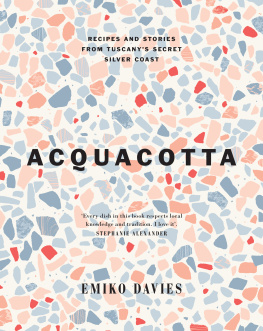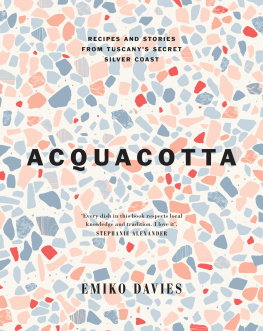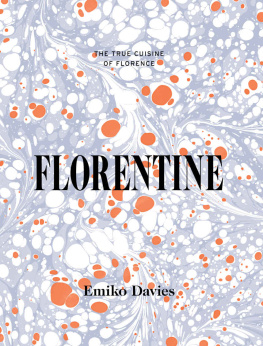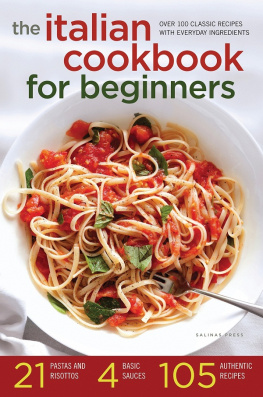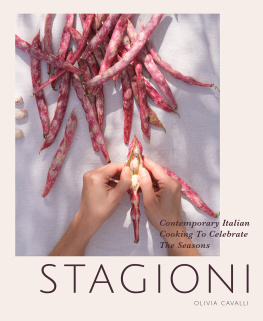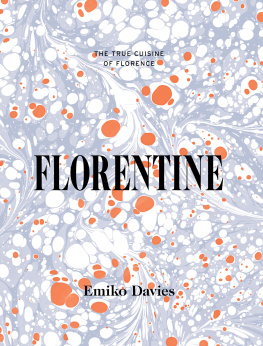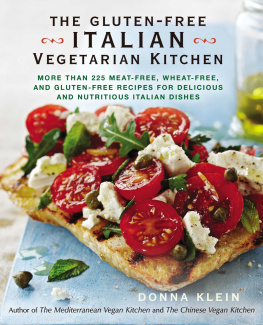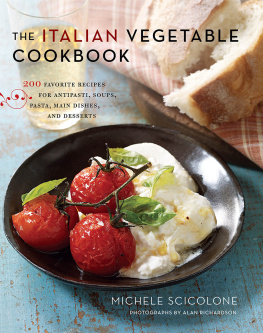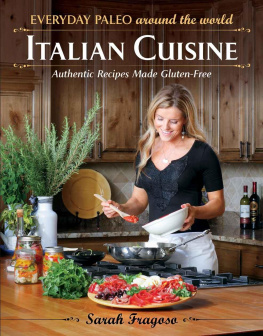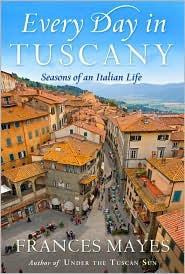
Many years before we met, I had visited the remote
and less well- known Tuscan region of the Maremma
and was amazed at its wild beauty. In 2017, Emiko
had just written and published Acquacotta and
after reading it I knew that part of my next holiday
would have to be in that part of Tuscany. And so I
did and visited many of the places she describes in
Acquacotta . I also went to Giglio Island, a story for
another day, and found it an unforgettable experience
that involved overcoming my fears and successfully
climbing many rocky and uneven steps and dis- embarking
from a small boat directly onto rocks.
Scary but exhilarating.
So I am pleased to have been asked to write a
foreword for this new edition of Acquacotta .
Emiko is not just a good cook; she is also a brilliant
photographer and a thorough researcher. Just as the
Maremma, or the Silver Coast as it is known, is an
interesting mix of mountain and rocky landscapes and
charming small towns teeming with life, so too does
this book allow the serious reader to know so much
of the history of Tuscany. It includes dishes from the
past that are still cooked today, together with very
accessible and simple combinations that feature
the best local ingredients. There could be no better
commentator and interpreter of the landscape and its
close connection to what one eats. Emiko notices and
My contribution and participation in social media is a bit hit and miss,
but it was through Instagram that I first made contact with the remarkable
Emiko Davies. In 2016 I read her first book, Florentine , and was enchanted.
Emiko seemed to share my interest in foodways first of all, then in art, and in
recording and noting how life was lived and enjoyed in that wonderful city.
I was planning a short holiday to Florence, where Emiko was living at the time.
I bravely made contact and am now pleased to report that we met, shared
a meal or two and have since become good friends, despite the distance.
notes down, and takes wonderful photos and follows
up to find out more.
In this book there are recipes that require skill and
lots of time, and there are others that are immediate.
Australian readers may have to make some substitutes
for harder to locate ingredients like fresh and salt- packed
anchovies, live eel and mantis shrimp, and
wild boar, and not every cook will be prepared to
make their own artichokes sottolio or sottaceti
( page ), but there are so many other possibilities.
You could start with the books titular soup, Acquacotta
( page ), or the crostini featuring polenta and
mushrooms ( page ), and move onto the delicious
fish and shellfish dishes ( pages ), the
tagliolini with chickpeas ( page ), the tomato
and celery leaf salad from Giglio Island ( page ),
the ricotta- filled pastries ( pages ), the
melon granita ( page ) and dozens more dishes.
I am already planning a party so I can cook a large
piece of venison in place of wild boar using Emikos
reproduction of cinghiale in dolce- forte ( page ),
an ancient dish that includes candied citron, chocolate
and pine nuts.
This is a beautiful book and turning the pages and
enjoying Emikos outstanding location shots will
have you planning a new holiday while you discover
a delicious dish for dinner.
FOREWORD
S T E P H A N I E A L E X A N D E R






This book is an ode to a beautiful sliver of the Maremma, in the southernmost
part of Tuscany, where I lived for six months in 2015 with my daughter and my
Tuscan husband, Marco, while he was working as Head Sommelier of
Il Pellicanos renowned restaurant. We made our home in the pretty little fishing
village of Porto Ercole, the smaller but more ancient of the two towns on the
rugged, island- like promontory of Monte Argentario. A few kilometres away is
Orbetello, with its lagoon and its strong Spanish history. The island of Giglio is
a short ferry ride away. And a quick drive down the road is the beautiful
town of Capalbio, the last Tuscan town on the border of Lazio.
Its a little corner of paradise known locally as la
Costa dArgento , the Silver Coast, supposedly named
for the silvery shimmer of the salt and pepper sand
that you find in these parts, along the Tyrrhenian Sea.
A little further inland are the towns of Saturnia, with
its pummelling natural hot springs; and Pitigliano,
a stunning and ancient town seemingly carved out
of the tuff rock it sits on, with a long and significant
Jewish heritage.
This is a region of wide open spaces, swaying wheat
fields, hills polka- dotted with olive trees, rambling
vineyards bearing native grapes, overgrown fig trees and
rampant prickly pears, long beaches and wild animals.
Little villages sit perched, relatively undisturbed,
on their hilltops with views of the sea their roots
stretching back to the most ancient of all Tuscans ( the
Etruscans). Closer to Rome than Florence, this stunning
corner of the Maremma has a cuisine influenced largely
by fishermen, hunters, farmers and butteri ( cowboys).
Straightforward, thrifty and fully dependent upon its
landscape of sea and hills, its rich with history and
flavour. And it is unlike any other in Tuscany.
One- pot dishes are a preferred way of cooking in the
area, and whether its a seafood or lamb stew or a soup
of vegetables and a poached egg, it is food that I love
to eat and love to cook comforting, low- maintenance
and easy to prepare. Much of it is born out of poverty,
which means there also happens to be a surprising
selection of vegan and gluten- free dishes ( see the
at the back of the
book to find these quickly). Its also food that calls for
sharing with friends or family, gathered around a big
table with plenty of local wine and good conversation,
perhaps finishing with a homemade digestif made from
foraged herbs. Like most peasant cuisine, its about
getting the best out of a few ingredients and providing
a belly- filling and nutritious meal that not only doesnt
cost the earth but is simply delicious.

